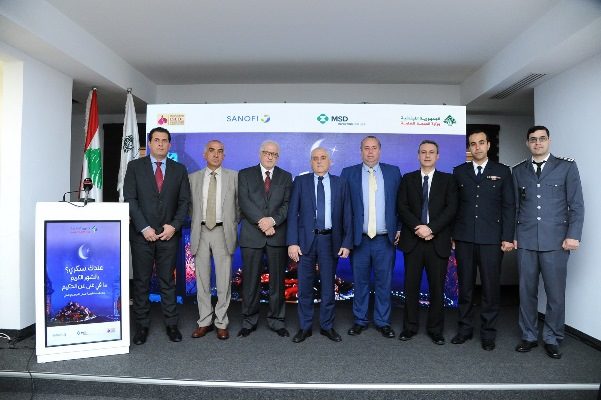Under the auspices and in the presence of the Minister of Public Health Dr. Jamil Jabak, the Ministry launched today the annual national awareness campaign on the updated guidelines for diabetes during the holy month of Ramadan. The campaign is in partnership with the Lebanese Society of Endocrinology, Diabetes and Lipids (LSEDL), Sanofi, and MSD. Launched during a press conference held at the premises of the Ministry, the campaign is designed to educate patients living with diabetes on safe fasting during Ramadan and outline strategies to minimize the risk factors.
Stressing the importance of this national campaign, Minister Dr. Jamil Jabak said: “Raising awareness around Diabetes during the holy month of Ramadan falls under the ministry’s strategic policy which promotes the culture of wellbeing and prevention. The prevalence of diabetes in Lebanon, especially type 2, is becoming alarming. This is a result of our modern lifestyle, unhealthy diet and physical inactivity.” Dr. Jabak added: “As are gearing up to welcoming Ramadan, we understand that some diabetic patients wish to fast during this month however we urge them to consult their doctors beforehand, undergo necessary checkups and adhere closely to their physicians’ instructions. I would like to re-emphasize here that the fasting experience for diabetics is completely different from the one of healthy people because they are at risk of developing critical complications that they can avoid”.
“Diabetic patients require extra planning and consideration to avoid unwanted complications of their condition during Ramadan. We urge patients to consult their physicians before fasting – it is crucial,” said Dr. Akram Echtay, Director of the National Diabetes Program. “It is also important to emphasize that in healthcare there is no ‘one size fits all’ solution. Each and every patient is unique, and we should always keep this in mind. Your doctor will undergo medical assessment through clinical checkups and laboratory tests before making a decision. Approval to fast is also associated with possible changes to medication and lifestyle to avoid any risks”.
Dr. Echtay also stressed that “Even if the physician has approved fasting, it’s critical to continue checking blood sugar levels frequently throughout the day and the night. If it’s low (below 70 mg/dl) or extremely high (above 300 mg/dl), it’s very dangerous to continue fasting and should break the fast immediately and contact their doctor. While in the case the doctor didn’t approve fasting, then patient should not at any risk fast as this will lead to critical complications”.
For individuals with diabetes who choose to fast during Ramadan, they need to follow the guidelines and the instructions of their doctors. These guidelines include frequent monitoring of blood sugar, rescheduling the timing of their medication, having healthy and balanced diet, exercising lightly.
On nutrition level, adopting different eating habits is also essential for diabetics to fast safely. Patients are advised to resist the temptation to have a particularly large meal at iftar and delay the Suhoor meal as much as possible. It is also recommended to include low glycemic index, high fiber foods that release energy slowly, such as whole grain bread, beans and rice. It’s very important to include fruits, vegetables and salads while minimizing foods that are high in saturated fats. Avoiding sugary desserts is also a must. When it comes to fluids, diabetics should stay hydrated by drinking plenty of water or other non-sweetened beverages and avoid caffeinated and sweetened drinks.
The awareness campaign will run pre and during Ramadan through a media campaign on TV, radio, press and online portals. In addition, community outreach programs are organized in collaboration with the municipalities, civic societies and social institutions in different places in Lebanon.

